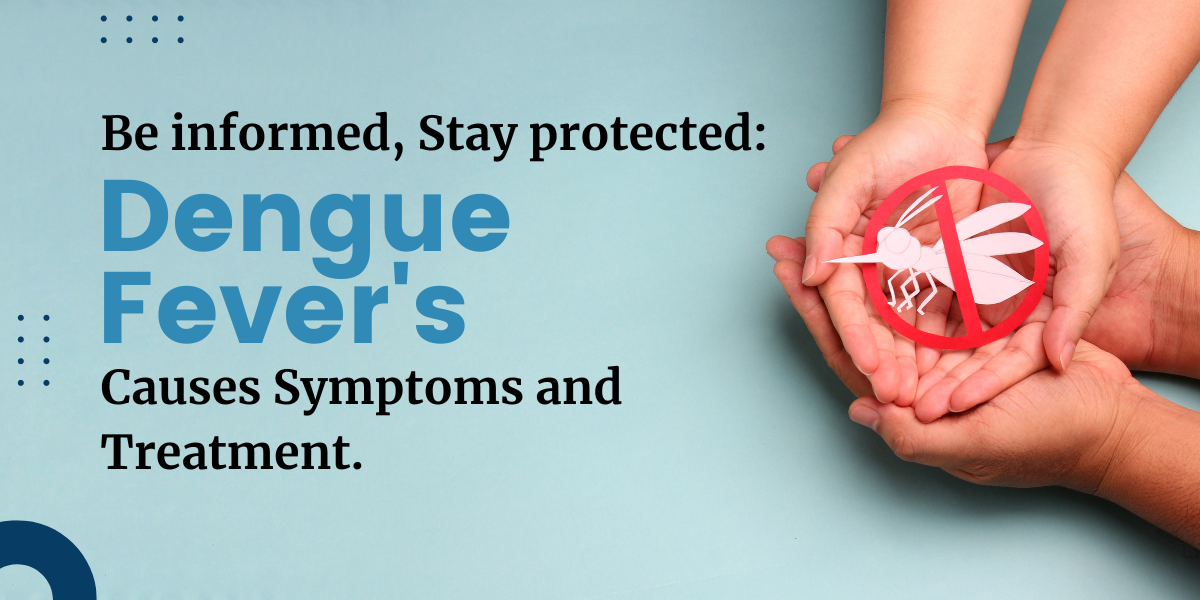Introduction:
Dengue fever is a prevalent mosquito-borne viral illness that poses a significant health risk in many parts of the world, especially during the dengue season. With its severe symptoms and potential complications, it’s crucial to be well-informed and take proactive measures to protect yourself and your loved ones. In this blog, we will provide you with valuable tips to navigate the dengue season, empowering you to stay safe and maintain optimal health.
Understanding Dengue Fever:
Dengue fever is caused by the dengue virus, which is primarily transmitted through the bite of infected Aedes mosquitoes. It can lead to flu-like symptoms, such as high fever, headaches, muscle and joint pain, fatigue and rash. In severe cases, dengue can progress to dengue hemorrhagic fever or dengue shock syndrome, which can be life-threatening. Understanding the symptoms and progression of dengue is crucial for early detection and timely medical intervention.
Mosquito Prevention:
Preventing mosquito bites is key to reducing the risk of dengue infection. To prevent dengue infection, here are some effective preventive measures:
- Apply mosquito repellents containing DEET or picaridin on exposed skin.
- Put on long pants, socks, and long-sleeved shirts to reduce the amount of exposed skin.
- Utilize bed nets that have been treated with insecticides to provide protection while sleeping.
- Keep doors and windows closed to prevent mosquitoes from entering your home.
- Remove standing water sources where mosquitoes can breed, such as flower pots, discarded tires, and open containers.
Environmental Hygiene:
- Maintaining a clean and hygienic environment plays a crucial role in preventing dengue transmission. Follow these practices:
- Regularly clean and empty water containers to prevent water stagnation.
- Discard of garbage properly, as it can attract mosquitoes.
- Keep your surroundings clean and eliminate potential sources of mosquito breeding sites.
- Encourage community efforts in maintaining a dengue-free environment, such as neighborhood clean-up campaigns.
Boosting Immunity:
- A strong immune system can help prevent dengue fever or lessen its severity. Focus on these immunity-boosting practices:
- Eat a balanced diet rich in fruits, vegetables, and whole grains.
- Drink plenty of water and fluids to Stay hydrated.
- Perform physical exercise regularly to keep your body fit and strengthen your immune system.
- Get adequate rest and quality sleep to support immune function.
- Consider adding supplements for immune-boosting , as recommended by healthcare professionals.
Early Detection and Medical Care:
Early detection and prompt medical care are vital for managing dengue fever effectively. If you experience symptoms associated with dengue, seek medical attention immediately. Medical professionals can conduct diagnostic tests, monitor your condition, and provide appropriate treatment to manage the symptoms and prevent complications. Follow their advice, take prescribed medications, and ensure sufficient rest and hydration.
Spreading Awareness:
Creating awareness about dengue prevention is crucial in combating the disease. Educate your family, friends, and community about the risks, preventive measures, and symptoms of dengue. Use social media to share information, organize community workshops, and participate in local health initiatives. By spreading knowledge and awareness, you can contribute to a safer and healthier environment for everyone.
Conclusion:
As dengue season approaches, it’s essential to equip yourself with knowledge and adopt preventive measures to stay safe and healthy. By understanding the symptoms, preventing mosquito bites, maintaining hygiene, boosting immunity, seeking early medical care, and spreading awareness, you can navigate the dengue season with confidence. Remember, personal and collective efforts play a crucial role in combating dengue and creating a dengue-free environment. Let’s prioritize our health and well-being to safeguard ourselves and our communities from this potentially dangerous disease.





